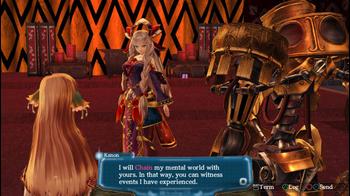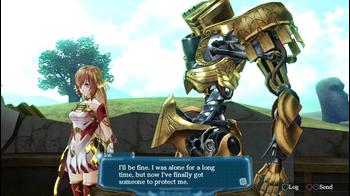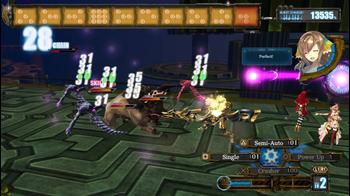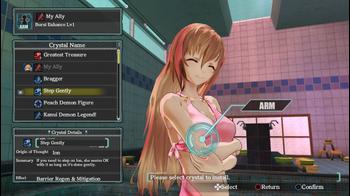Ar nosurge: Ode to an Unborn Star Review
I had my first brush with the “Ar” series having reviewed Ar Tonelico Qoga a few years ago. I'd definitely heard of the series when it first came out on the Playstation 2 late in its cycle, but only thanks to some of its more “colorful” moments that people still like to bring up to this day.
After finding out that Ciel nosurge was the next entry from the same team, I was a little disheartened knowing that it played out more like a dating sim than an RPG and thus would likely never see the light of day here in the West. Then came Ar nosurge, a tried-and-true JRPG that fit well among the ranks of the developer’s prior genre offerings, and things still seemed out of reach considering the source material.
Ar nosurge: Ode to an Unborn Star serves as a prequel to the Ar Tonelico series, which seems appropriate considering it has so much in common with its series’ brethren.
After waking up from cryostasis, our characters find themselves stranded out in space on a giant ship thousands of years following the destruction of their home planet of Ra Ciela. As life seemed to drag on uneventfully for the weary travelers, a mysterious race of winged creatures known as the Sharl suddenly appeared, and without warning started to kidnap humans, spiriting them off to some unknown place.
The humans aboard the ship split into two factions. One group, fearing the destruction of their race, banded together under the banner of survival against what is to them ultimately and absolutely evil. A dissonant group decided to coexist with the Sharl as a means to escape hardship. What begins as a seemingly blatant act of malevolence soon becomes a case study on what false perception can lead to. Nothing in the game's plotting ever felt simple or one-dimensional, and I liked that.
The story revolves around two pairs of characters: Delta Lanthanoir with Casty Riernott, and Ionasal kkll Preciel with the robot Earthes. While the former can be mistaken for any teenage romance between a young boy and young girl who enjoy to tease each other and get into silly arguments, things become far more intimate as the game reaches its climax.
One of the biggest fears I had coming in to this game was knowing that Ciel nosurge, the game that predated Ar nosurge and in fact has a story that directly follows it, has at least up until now not been localized - and looks unlikely to ever be.
Almost immediately and throughout this, then, the impact of this void are felt. Key plot moments in Ciel are only briefly touched upon, but are still meant to serve as the foundation for everything that was supposed to happen going forward in Ar nosurge’s adventure.
Over time, the game does its best to fill you in more and more about what had happened, so that initial shock begins to dull until it is no longer an issue by around the middle of the second act. I pretty much had a good grasp on all that had happened prior, and I don’t expect anyone else to feel differently.
The Genometrics system brings back one of my favorite aspects of the entire series, taking the place of Ar Tonelico’s ‘Dive’ feature, a feature that lets players unlock new Song Magic to use in battle by developing personal bonds by diving into their subconscious.
Where in Ar Tonelico you were only limited to engaging in this with the main heroines of the game, in Ar nosurge you are able to engage with all most of the main cast, providing a far more well-rounded approach that lets you see things from all angles, providing an amazing experience in the process which can even on a direct impact on your relationship with that person when you encounter them in the game.
Things are also much more straightforward here, with very little guesswork involved on where to go next and playing out more like a visual novel in its presentation. Unlike Ar Tonelico, events are repeatable, letting you unlock new abilities - and this is a particularly welcome change.
I'm a huge fan of the game’s ability to provide a very deep character-driven tale that puts a large focus into diving into the deepest and darkest corners of one’s heart. Each person has their own deep secrets and facades, and by looking into them, one can build a far more powerful bond with others as the player and see it transform the rapport between the others in this world.
This also essentially gives every major character in the story a profound importance to define their role in the plot. The incredible thing is that players can simply go skin deep with this feature and only touch upon the mandatory scenes necessary for advancing the story, or they can persevere and discover what is arguably the richest narratives found in the genre thanks to the excellent writing found in Ar nosurge.
Nowhere is this more evident than in the story viewed from Ion’s perspective. From afar, the relationship between this young, innocent woman and the guardian robot Earthes who serves to protect her seems more than a little odd given the obvious incompatibility.
However, as I found myself diving deeper and deeper into the many levels that the Genometrics system brings, I discovered that I had only seen the tip of the iceberg of this downright beautiful affinity.
Of course, there is a lot more going on there which is explained in the main story, but I don’t think one could get anywhere near the amount of character development without advancing to the very end of a person’s Genometrics.
The combat found in Ar nosurge is fairly straightforward and is largely comprised of elements found in the rest of the series. While out in the field, a bar at the corner of the screen begins to glow from a deep blue to a dark red to indicate an enemy encounter.
Once inside battle, the turn-based combat system is turned on its head as players will be tasked to fight off several rows of enemies grouped in waves indicated at the top of the screen. Actions are mapped to the face buttons, letting you take a few quick swipes, attack a vertical row of enemies, or hit that X button to try and shatter a foe’s shield.
Each of these attacks come with their own stock count that can be increased and made more effective with the right equipment. Skills can also be used after filling a meter through the use of normal moves.
There’s a tug-of-war game going on here where you are only giving a set number of turns to defeat all of the rows at enemies. By staggering an enemy at just the right moment, which is usually the one who is meant to go next in the rotation, players will be able to steal a turn from the enemy and letting you go again immediately.
This continues all the way to the very end of the fight, with some battles including fifty rows of opponents to defeat. Fortunately, this is made easier through the use of Song Magic. Almost every action a player takes in battle contributes to a percentage meter at the top right of the battle screen. As this number grows, each box in the enemy wave box begins to fill with red from right to left.
The idea is to fill every single row with red before releasing this incredible display of wanton destruction, which provides a pretty satisfying way to end any encounter.
Where everything seems to fall short is in what can only be described as a messy localization. Practically every conversation that occurs throughout the game is littered with typos, grammatical mistakes, and downright confusing dialogue, adding up to an overwhelming amount of frustration by the time the game is over and almost ruining the immersion strong characterization builds in the process.
Character names are constantly misspelled - in a single conversation, I heard Zill’s name spelled as Jill at least five times. My thought process went something like, “Is it Jill? Is it Zill? That person said Jill, but that person said Zill. The encyclopedia said Zill but those two said Jill.”
Quantave is also mistakenly called Quanturv on several occasions. NPC dialogue would sometimes run completely out of order, starting in the middle of a normal conversation or changing topics before a sentence is complete. I even found a few who had someone else’s dialogue take the place of theirs, like this woman who called herself an old man.
I guess you could blame the relatively short turnaround in localization, and the mistakes do lessen the farther you get into the game, but most of this is downright inexcusable for the genre.
In the audio and visual department, Ar nosurge doesn’t disappoint in the slightest. The Song Magic itself is arguably the best that the series has ever offered and contributing to one of the best soundtracks I have heard in years, providing plenty of emotionally powerful moments no matter the situation.
The voice acting is also solid whether you enjoy listening to the characters in either Japanese or English (I personally think Johnny Yong Bosch turned in a better "Delta" than the Japanese VA did), though the game does suffer from the “Ni no Kuni” syndrome of having too many key moments without voiced dialogue.
It's a sharp-looking game, with plenty of clean detail in character models, especially when it comes to Earthes. There's a few weird technical issues, however, including the stand-out issue that every time the controlled character would near a save point, door, person, or other selectable object, the game would hitch for a moment. It would frequently make me think I was about to go into battle when I really wasn’t.
I also experienced slowdown when too many player models are on screen at once, but this only happened a few times throughout the entire game; otherwise, the framerate was fluid even when things got hectic in battle. It's a shame that a generally nice-looking game seems to have some strange technical issues found within.
Despite the annoying setbacks in its localization, mixed performance and confusing introduction thanks to a lack of context, Ar nosurge: Ode to an Unborn Star is still an excellent game that offers a huge amount of content for players to sink their teeth into, including a simple crafting system. Most notable to me is the excellent execution on its memorable character development and presentation, topped off by a downright brilliant soundtrack. This title is certainly worth the time of any fan of the JRPG genre.




